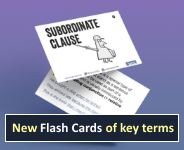Glossary
The Englicious Glossary includes the new National Curriculum glossary terms, which are shown against a white background. However, there's much more to be found here:
- we have added many entries that we feel are important, but cannot be found in the NC Glossary (e.g. connective), and
- in many cases we have added information to the (often very brief) NC entries that need further explanation (e.g. clause and phrase).
Please note that in line with our practice throughout the site, we use capital letters for function terms such as Subject, Direct Object, Indirect Object, Modifier, etc. Although this convention is not followed in the documentation published by the Department for Education we have also done so in the text that forms part of the National Curriculum Glossary.
Tip: Within our units and resources, Glossary items appear highlighted within the text. When you hover over them, or click on them in the Slideshow, a popup is generated.
idiom
imperative clause
indefinite article
indefinite pronoun
Indirect Object
infinitive
A verb’s infinitive is the basic form used as the head-word in a dictionary (e.g. walk, be).
Infinitives are often used:
- after to
- after modal verbs.
- I want to walk.
- I will be quiet.
The infinitive with to is called the to-infinitive, whereas the infinitive without to, for example after modal verbs, is called the bare infinitive. We can then say that the clause after a modal verb is a bare infinitive clause (e.g. We can send you some more information.)
inflection
When we add -ed to walk, or change mouse to mice, this change of morphology produces an inflection (‘bending’) of the basic word which has special grammar (e.g. past tense or plural). In contrast, adding -er to walk produces a completely different word, walker, which is part of the same word family. Inflection is sometimes thought of as merely a change of ending, but, in fact, some words change completely when inflected.
- dogs is an inflection of dog.
- went is an inflection of go.
- better is an inflection of good.
An inflection is a change to the base form of a word to express grammatical information, usually by adding an ending (or suffix). Sometimes inflection involves another kind of change to the base form (e.g. mouse/mice).
inflectional morphology
information structuring
The ability to structure the presentation of information in different ways in sentences and clauses, for example to place emphasis on a particular part. Typical strategies for information structuring include employing passive voice and preposing or postposing elements.
- I really like those shoes ~ Those shoes, I really like [them] (preposing).
- I left the cake out in the rain ~ The cake was left out in the rain [by me] (passive).
See also fronting.
-ing participle
initialism
intensifier
interjection
international phonetic alphabet
interrogative clause
interrogative pronoun
intertextuality
intransitive preposition
intransitive verb
A verb which does not need an Object in a sentence to complete its meaning is described as intransitive. See transitive verb.
- We all laughed.
- We would like to stay longer, but we must leave.

